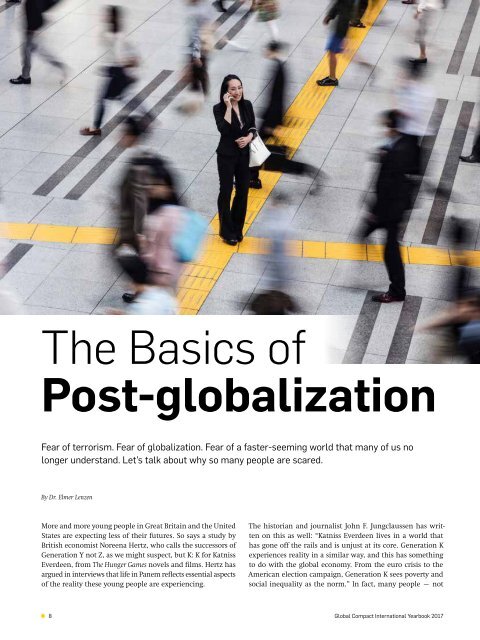Sustainability in Troubled Times
We live in times of uncertainty and global (dis)order. „Understanding global mega-trends is crucial. We live in times of multiple, evolving and mutually-reinforcing shifts“, says UN Secretary-General António Guterres. He adds: „These dynamics, of geopolitical, demographic, climatic, technological, social and economic nature, enhance threats and opportunities on an unprecedented scale.“ Therefore sustainability in troubled times is the key topic of this Sustainability Yearbook 2017, edited by macondo publishing. In the opening essay, Elmer Lenzen takes a critical look at the relationship between democracy and globalization. For decades this combination was a formula for success. Now both are experiencing troubled times. UN Global Compact founding director Georg Kell and Princeton professor Larry Diamond, who are well- known figures in this field, explain some of the reasons why in a profound interview. One reason is that today’s world is becoming more fragmented. So how can sustainability work in these times? It can work if we focus on the needs of the present without compromising the abilities of the future, says Global Compact Action Platform fellow Richard Roberts, and by utilizing the advantages of tomorrow. But doing the right thing in critical times is also a question of attitude. The entrepreneur Richard Branson and the actor Colin Firth both show in their own ways that sustainability means authenticity.
We live in times of uncertainty and global (dis)order. „Understanding global mega-trends is crucial. We live in times of multiple, evolving and mutually-reinforcing shifts“, says UN Secretary-General António Guterres. He adds: „These dynamics, of geopolitical, demographic, climatic, technological, social and economic nature, enhance threats and opportunities on an unprecedented scale.“ Therefore sustainability in troubled times is the key topic of this Sustainability Yearbook 2017, edited by macondo publishing.
In the opening essay, Elmer Lenzen takes a critical look at the relationship between democracy and globalization. For decades this combination was a formula for success. Now both are experiencing troubled times. UN Global Compact founding director Georg Kell and Princeton professor Larry Diamond, who are well- known figures in this field, explain some of the reasons why in a profound interview. One reason is that today’s world is becoming more fragmented. So how can sustainability work in these times?
It can work if we focus on the needs of the present without compromising the abilities of the future, says Global Compact Action Platform fellow Richard Roberts, and by utilizing the advantages of tomorrow. But doing the right thing in critical times is also a question of attitude. The entrepreneur Richard Branson and the actor Colin Firth both show in their own ways that sustainability means authenticity.
Create successful ePaper yourself
Turn your PDF publications into a flip-book with our unique Google optimized e-Paper software.
The Basics of<br />
Post-globalization<br />
Fear of terrorism. Fear of globalization. Fear of a faster-seem<strong>in</strong>g world that many of us no<br />
longer understand. Let’s talk about why so many people are scared.<br />
By Dr. Elmer Lenzen<br />
More and more young people <strong>in</strong> Great Brita<strong>in</strong> and the United<br />
States are expect<strong>in</strong>g less of their futures. So says a study by<br />
British economist Noreena Hertz, who calls the successors of<br />
Generation Y not Z, as we might suspect, but K: K for Katniss<br />
Everdeen, from The Hunger Games novels and films. Hertz has<br />
argued <strong>in</strong> <strong>in</strong>terviews that life <strong>in</strong> Panem reflects essential aspects<br />
of the reality these young people are experienc<strong>in</strong>g.<br />
The historian and journalist John F. Jungclaussen has written<br />
on this as well: “Katniss Everdeen lives <strong>in</strong> a world that<br />
has gone off the rails and is unjust at its core. Generation K<br />
experiences reality <strong>in</strong> a similar way, and this has someth<strong>in</strong>g<br />
to do with the global economy. From the euro crisis to the<br />
American election campaign, Generation K sees poverty and<br />
social <strong>in</strong>equality as the norm.” In fact, many people – not<br />
8<br />
Global Compact International Yearbook 2017

















